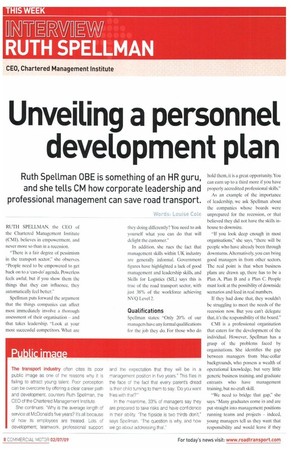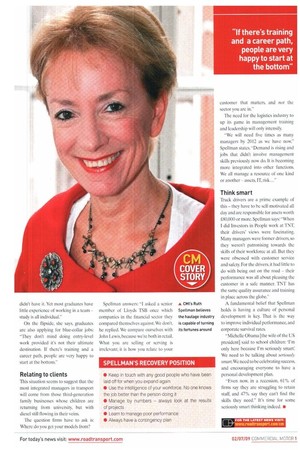Unveiling a personnel.
Page 18

Page 19

If you've noticed an error in this article please click here to report it so we can fix it.
deveLopment plan
Ruth Spellman OBE is something of an HR guru, and she tells CM how corporate leadership and professional management can save road transport.
Words : Louise Cole
RUTH SPELLMAN, the CEO of the Chartered Management Institute (CMI), believes in empowerment, and never more so than in a recession.
"There is a fair degree of pessimism in the transport sector," she observes. "People need to be empowered to get back on to a 'can-do' agenda. Powerless feels awful, hut if you show them the things that they can influence, they automatically feel better."
Spellman puts forward the argument that the things companies can affect most immediately involve a thorough assessment of their organisation and that takes leadership. "Look at your most successful competitors. What are they doing differently? You need to ask yourself what you can do that will delight the customer."
In addition, she rues the fact that management skills within UK industry are generally informal. Government figures have highlighted a lack of good management and leadership skills, and Skills for Logistics (S1L) says this is true of the road transport sector, with just 38% of the workforce achieving NVO Level 2.
Qualifications
Spellman states: "Only 20% of our managers have any formal qualifications for the job they do. For those who do hold them, it is a great opportunity You can earn up to a third more if you have properly accredited professional skills."
As an example of the importance of leadership, we ask Spellman about the companies whose boards were unprepared for the recession, or that believed they did not have the skills inhouse to downsize.
"If you look deep enough in most organisations," she says, "there will be people who have already been through downturns. Alternatively, you can bring good managers in from other sectors. The real point is that when business plans are drawn up, there has to be a Plan A, Plan B and a Plan C. People must look at the possibility of downside scenarios and feed in real numbers.
If they had done that, they wouldn't be struggling to meet the needs of the recession now. But you can't delegate that, it's the responsibility of the board."
CM] is a professional organisation that caters for the development of the individual. However. Spellman has a grasp of the problems faced by organisations. She identifies the gap between managers from blue-collar backgrounds, who possess a wealth of operational knowledge, but very little generic business training, and graduate entrants who have management training, but no craft skill.
"We need to bridge that gap,she says. "Many graduates come in and are put straight into management positions running teams and projects indeed, young managers tell us they want that responsibility and would leave if they
didn't have it. Yet most graduates have little experience of working in a team study is all individual."
On the flipsicle, she says, graduates are also applying for blue-collar jobs: "They don't mind doing entry-level work provided it's not their ultimate destination. If there's training and a career path, people are very happy to start at the bottom."
Relating to clients
This situation seems to suggest that the most integrated managers in transport will come from those third-generation family businesses whose children are returning from university, but with diesel still flowing in their veins.
The question firms have to ask is: Where do you get your models from? Spellman answers: "I asked a senior member of Lloyds TSB once which companies in the financial sector they compared themselves against. We don't. he replied. We compare ourselves with John Lewis, because we're both in retail. What you are selling or serving is irrelevant, it is how you relate to your customer that matters, and not the sector you are in."
The need for the logistics industry to up its game in management training and leadership will only intensify.
"We will need five times as many managers by 2012 as we have now,Spellman states. "Demand is rising and jobs that didn't involve management skills previously now do. It is becoming more integrated into other functions. We all manage a resource of one kind or another assets. IT, risk..."
Think smart
Truck drivers are a prime example of this they have to be self-motivated all day and are responsible for assets worth £80,000 or more. Spellman says: "When I did Investors in People work at TNT, their drivers' views were fascinating. Many managers were former drivers, so they weren't patronising towards the skills of their workforce at all. But they were obsessed with customer service and safety. For the drivers, it had little to do with being out on the road their performance was all about pleasing the customer in a safe manner. TNT has the same quality assurance and training in place across the globe."
A fundamental belief that Spellman holds is having a culture of personal development is key. That is the way to improve individual performance, and corporate survival rates.
"Michelle Obama [the wife of the US president] said to school children: 'I'm only here because I'm seriously smart: We need to be talking about seriously smart.We need to be celebrating success, and encouraging everyone to have a personal development plan.
"Even now, in a recession, 61% of firms say they are struggling to retain staff, and 47% say they can't find the skills they need." It's time for some seriously smart thinking indeed. •
















































































































































